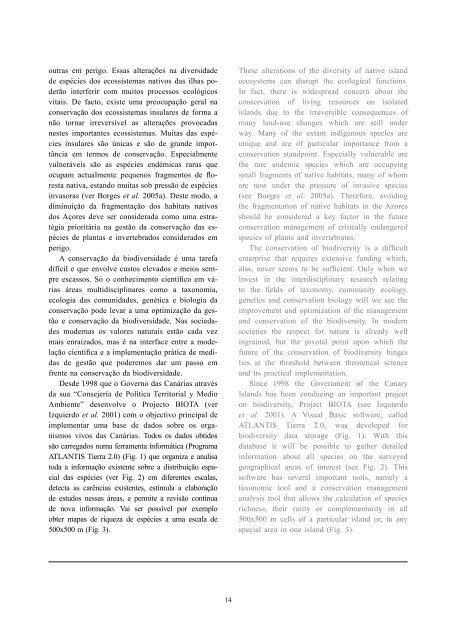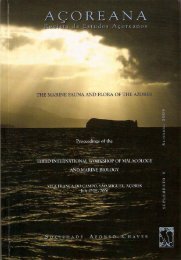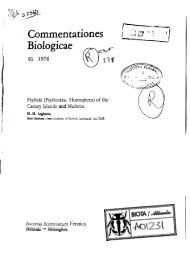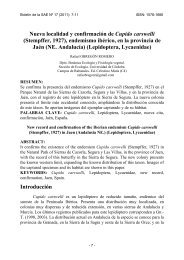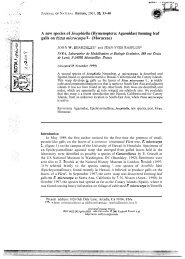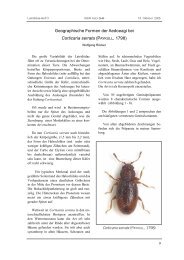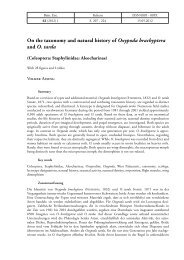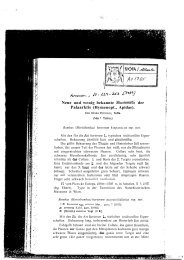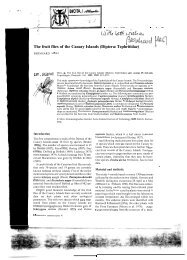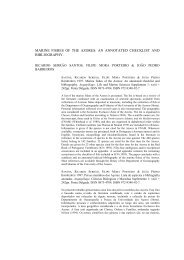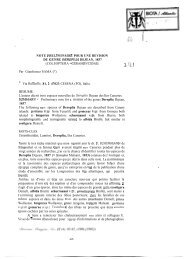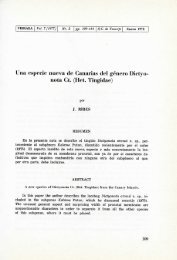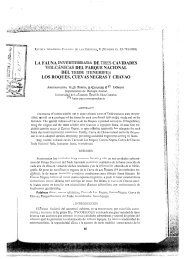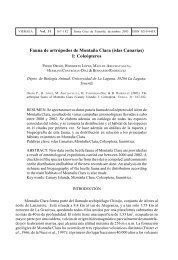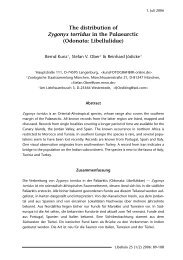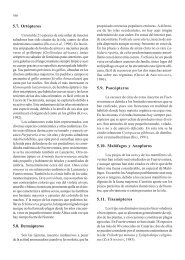(eds.) (2005). - Portal da Biodiversidade dos Açores - Universidade ...
(eds.) (2005). - Portal da Biodiversidade dos Açores - Universidade ...
(eds.) (2005). - Portal da Biodiversidade dos Açores - Universidade ...
You also want an ePaper? Increase the reach of your titles
YUMPU automatically turns print PDFs into web optimized ePapers that Google loves.
outras em perigo. Essas alterações na diversi<strong>da</strong>de<br />
de espécies <strong>dos</strong> ecossistemas nativos <strong>da</strong>s ilhas poderão<br />
interferir com muitos processos ecológicos<br />
vitais. De facto, existe uma preocupação geral na<br />
conservação <strong>dos</strong> ecossistemas insulares de forma a<br />
não tornar irreversível as alterações provoca<strong>da</strong>s<br />
nestes importantes ecossistemas. Muitas <strong>da</strong>s espécies<br />
insulares são únicas e são de grande importância<br />
em termos de conservação. Especialmente<br />
vulneráveis são as espécies endémicas raras que<br />
ocupam actualmente pequenos fragmentos de floresta<br />
nativa, estando muitas sob pressão de espécies<br />
invasoras (ver Borges et al. <strong>2005</strong>a). Deste modo, a<br />
diminuição <strong>da</strong> fragmentação <strong>dos</strong> habitats nativos<br />
<strong>dos</strong> <strong>Açores</strong> deve ser considera<strong>da</strong> como uma estratégia<br />
prioritária na gestão <strong>da</strong> conservação <strong>da</strong>s espécies<br />
de plantas e invertebra<strong>dos</strong> considera<strong>dos</strong> em<br />
perigo.<br />
A conservação <strong>da</strong> biodiversi<strong>da</strong>de é uma tarefa<br />
difícil e que envolve custos eleva<strong>dos</strong> e meios sempre<br />
escassos. Só o conhecimento científico em várias<br />
áreas multidisciplinares como a taxonomia,<br />
ecologia <strong>da</strong>s comuni<strong>da</strong>des, genética e biologia <strong>da</strong><br />
conservação pode levar a uma optimização <strong>da</strong> gestão<br />
e conservação <strong>da</strong> biodiversi<strong>da</strong>de. Nas socie<strong>da</strong>des<br />
modernas os valores naturais estão ca<strong>da</strong> vez<br />
mais enraiza<strong>dos</strong>, mas é na interface entre a modelação<br />
científica e a implementação prática de medi<strong>da</strong>s<br />
de gestão que poderemos <strong>da</strong>r um passo em<br />
frente na conservação <strong>da</strong> biodiversi<strong>da</strong>de.<br />
Desde 1998 que o Governo <strong>da</strong>s Canárias através<br />
<strong>da</strong> sua “Consejería de Política Territorial y Medio<br />
Ambiente” desenvolve o Projecto BIOTA (ver<br />
Izquierdo et al. 2001) com o objectivo principal de<br />
implementar uma base de <strong>da</strong><strong>dos</strong> sobre os organismos<br />
vivos <strong>da</strong>s Canárias. To<strong>dos</strong> os <strong>da</strong><strong>dos</strong> obti<strong>dos</strong><br />
são carrega<strong>dos</strong> numa ferramenta informática (Programa<br />
ATLANTIS Tierra 2.0) (Fig. 1) que organiza e analisa<br />
to<strong>da</strong> a informação existente sobre a distribuição espacial<br />
<strong>da</strong>s espécies (ver Fig. 2) em diferentes escalas,<br />
detecta as carências existentes, estimula a elaboração<br />
de estu<strong>dos</strong> nessas áreas, e permite a revisão contínua<br />
de nova informação. Vai ser possível por exemplo<br />
obter mapas de riqueza de espécies a uma escala de<br />
500x500 m (Fig. 3).<br />
14<br />
These alterations of the diversity of native island<br />
ecosystems can disrupt the ecological functions.<br />
In fact, there is widespread concern about the<br />
conservation of living resources on isolated<br />
islands due to the irreversible consequences of<br />
many land-use changes which are still under<br />
way. Many of the extant indigenous species are<br />
unique and are of particular importance from a<br />
conservation standpoint. Especially vulnerable are<br />
the rare endemic species which are occupying<br />
small fragments of native habitats, many of whom<br />
are now under the pressure of invasive species<br />
(see Borges et al. <strong>2005</strong>a). Therefore, avoiding<br />
the fragmentation of native habitats in the Azores<br />
should be considered a key factor in the future<br />
conservation management of critically en<strong>da</strong>ngered<br />
species of plants and invertebrates.<br />
The conservation of biodiversity is a difficult<br />
enterprise that requires extensive funding which,<br />
alas, never seems to be sufficient. Only when we<br />
invest in the interdisciplinary research relating<br />
to the fields of taxonomy, community ecology,<br />
genetics and conservation biology will we see the<br />
improvement and optimization of the management<br />
and conservation of the biodiversity. In modern<br />
societies the respect for nature is already well<br />
ingrained, but the pivotal point upon which the<br />
future of the conservation of biodiversity hinges<br />
lies at the threshold between theoretical science<br />
and its practical implementation.<br />
Since 1998 the Government of the Canary<br />
Islands has been conducing an important project<br />
on biodiversity, Project BIOTA (see Izquierdo<br />
et al. 2001). A Visual Basic software, called<br />
ATLANTIS Tierra 2.0, was developed for<br />
biodiversity <strong>da</strong>ta storage (Fig. 1). With this<br />
<strong>da</strong>tabase it will be possible to gather detailed<br />
information about all species on the surveyed<br />
geographical areas of interest (see Fig. 2). This<br />
software has several important tools, namely a<br />
taxonomic tool and a conservation management<br />
analysis tool that allows the calculation of species<br />
richness, their rarity or complementarity in all<br />
500x500 m cells of a particular island or, in any<br />
special area in one island (Fig. 3).


